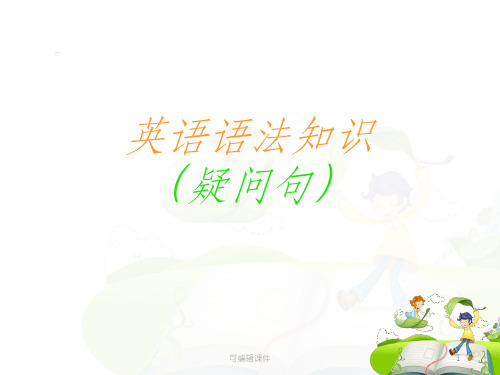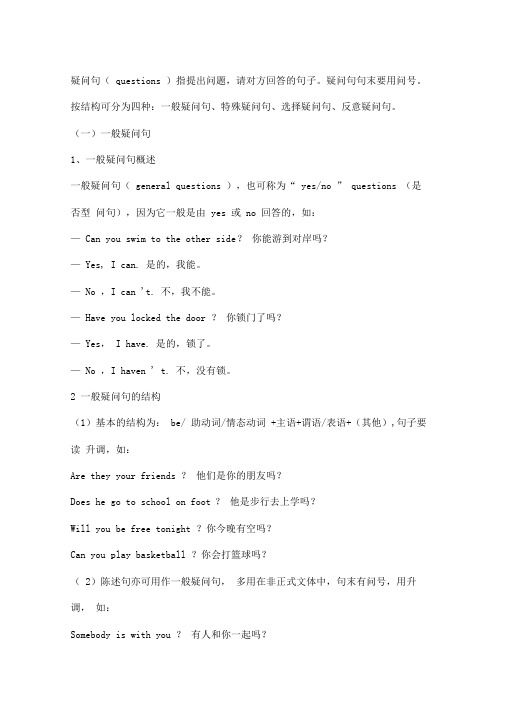五年级英语一般疑问句和特殊疑问句知识精讲
五年级否定句,一般疑问句,特殊疑问句讲解和练习

五年级否定句,一般疑问句,特殊疑问句讲解和练习研究必备欢迎下载否定句,一般疑问句,特殊疑问句句型转换的方法一、肯定句改否定句的方法——一步法1、在be动词后加not。
如:is not。
are not,am not,was not,were not;2、在can,should,will等后加not。
如:cannot,should not,will not;3、上述都没有的,在动词前加助动词否定形式XXX、some改成any。
把下面的句子变成否定句。
1.She is watching TV now._____________________________________________2.We go to school on Sunday.___________________________________________3.His father works hard._______________________________________________4.X XX'XXX.____________________________________________5.The cat runs fast.____________________________________6.They like XXX.__________________________________7.My grandpa gives me a hot dog._____________________________________8.Tom often walks to school._________________________________________9.I have a doll._______________________________________10.It XXX.______________________________________二、肯定句改一般疑问句的方法——三步法1、把be动词放在句首,剩下的照抄,(some改成any,my改成your等)句点改成问号。
小学英语特殊疑问句和一般疑问句地归纳

特殊疑问句和一般疑问句的答法一般疑问句通常都是 1..以be (am,is,are,)开头2.以Do,Does,Did 开头或以Can开头回答方法:前面用什么提问的就用什么答。
只有两种回答方式:1)肯定的, Yes,主语 + 提问词.2)否定的 No,主语+提问词+not.【注意:问句与答句的第一二人称要互换】如:④主语是名字时的答语:看性别,男的用he ,女的用she ,其他的用it 复数就用they。
如:①Is she……? Is he………? Is it……..?Yes, she is. Yes, he is. Yes, it is.No, she isn,t. No, he isn,t. No, it isn,t.②Are they………? Are the monkeys …….?Yes, they are. Yes, they are.No,they aren’t No,they aren’t③ Do they………? Does he……..? Did she…….?Yes,they do. Yes,he does. Yes, she did.No,they don’t. No,he doesn’t. No,she didn’t.④Are you……..? Are you……..? Do you…….?Yes, I am. Yes, we are. Yes ,I do. 或 Yes,No, I am not. No, we aren’t. No,I don’t. 或No,⑤Does Mike…….? Is ChenJi…..? Do your parents…?Yes ,he does. Yes , she is. Yes, they do.No,he doesn’t. No, she isn’t. No,they don’t.一、专项练习。
1. Did ChenJie read books yesterday?2. Can the girl cook the meals ?—————————————————————————————3.Is he going to swim this afternoon?4. Are they going to take a trip next weend? ————————————————————————————————5.Does he often go to school by bike ? 6. Do you play basketball every weekend? ———————————————————————————————————7. Did Mike do his homework yesterday? 8. Are they playing basketball now?————————————————————————————————一般疑问句及特殊疑问句的总结一般疑问句的定义:用yes或no来回答的疑问句叫一般疑问句。
小学英语语法---一般疑问句和特殊疑问句ppt课件

可编辑课件
4
e.g
This is Amy's bike.(一般疑问句)
Is this Amy's bike?
Yes, this is. (肯定回答)错误
No, this isn‘t. (否定回答)错误
Did you go to Beijing last weekend?
Yes, I did. (肯定回答)
2、如句子里是动词就在这些词前加 don't,doesn't,didn't
(1)主语是第一、二人称(复数)加don’t,第三人称单数加
doesn't
(2)如果是过去式就加didn't
例:I like dogs.
She likes swimming.
I don‘t like dogs.
She doesn’t like swimming.
No, I didn't. (否定回答)
I have some books. (一般疑问句)
Do you have any b可o编辑o课件ks?
5
变否定句的做法:
1、如句子里是be动词:am,is,are,was,were 就在这些词后加 not
例: He is Tom.
He is not Tom.
( B) 25. ______ tea did you have?
Two cups. • How many B. How much C. How soon D. Which
可编辑课件
15
感谢亲观看此幻灯片,此课件部分内容来源于网络, 如有侵权请及时联系我们删除,谢谢配合!
感 谢 阅
读感
谢
(完整版)英语一般疑问句和特殊疑问句的讲解及练习

一般疑问句用be动词(am /is主语+其他成分,+主语+提问的词.否定:No,+主语+提问的词+not.Are you from Japan﹖Yes ,I am./ No, I'm not.Is her sister doing her homework now﹖Yes, she is./ No, she isn't.Does he work in a bank﹖Yes, he does./ No, he doesn't.Can you speak French﹖Yes, I can./ No, I can't.一: 般疑问句还有下列特点:1、以be动词、助动词或情态动词开头;例:Is your father a teacher? Does Catherine like animals? Can Jenny speak French?二: 如何将陈述句变成一般疑问句?1.如句中有be 动词(am、is、are、was、were can、may、must …)或助动词(do、does、did、have、had(完成时中))时,可直接将它们提到句首,句末打上问号即可。
主语为第一人称,应将其改为第二人称。
例:It was rainy yesterday.→Was it rainy yesterday?Tom's father can play the piano.→Can Tom's father play the piano?I have finished my homework.→Have you finished your homework?2.如果句中没有be动词、助动词或情态动词,则根据谓语动词的形式借助do的相应形式放在句首。
具体方法是:如果谓语动词是原形,则借do;如果谓语动词是一般现在时第三人称单数形式,则借does;如果谓语动词是过去式,则借did. 需要注意的是,借does或did后,原句的谓语动词要变回原形。
一般疑问句、特殊疑问句、选择疑问句、反义疑问句地详细用法

疑问句( questions )指提出问题,请对方回答的句子。
疑问句句末要用问号。
按结构可分为四种:一般疑问句、特殊疑问句、选择疑问句、反意疑问句。
(一)一般疑问句1、一般疑问句概述一般疑问句( general questions ),也可称为“ yes/no ” questions (是否型问句),因为它一般是由 yes 或 no 回答的,如:— Can you swim to the other side ?你能游到对岸吗?— Yes, I can. 是的,我能。
— No ,I can 't. 不,我不能。
— Have you locked the door ?你锁门了吗?— Yes, I have. 是的,锁了。
— No ,I haven ' t. 不,没有锁。
2 一般疑问句的结构(1)基本的结构为: be/ 助动词/情态动词 +主语+谓语/表语+(其他),句子要读升调,如:Are they your friends ?他们是你的朋友吗?Does he go to school on foot ?他是步行去上学吗?Will you be free tonight ?你今晚有空吗?Can you play basketball ?你会打篮球吗?( 2)陈述句亦可用作一般疑问句,多用在非正式文体中,句末有问号,用升调,如:Somebody is with you ?有人和你一起吗?He didn ' t finish the work ?他没有做完活吗?You are fresh from America , I suppose ?我猜,你刚从美国回来吧?3、一般疑问句的答语( 1)一般疑问句一般由 yes 或 no 来回答,如:— Are you tired ?你累了吗?— Yes,I am. 是的 ,累了。
— No, I ' m not. 不,不累。
— Does she do the cleaning ?她扫除了吗?— Yes , she does. 是的,她打扫了。
小学英语特殊疑问句和一般疑问句的归纳

特殊疑问句和一般疑问句的答法一般疑问句通常都是 1..以be (am,is,are,)开头2.以Do,Does,Did 开头或以Can开头回答方法:前面用什么提问的就用什么答。
只有两种回答方式:1)肯定的, Yes,主语 + 提问词.2)否定的 No,主语+提问词+not.【注意:问句与答句的第一二人称要互换】如:④主语是名字时的答语:看性别,男的用he ,女的用she ,其他的用it 复数就用they。
如:①Is she…… Is he……… Is it……..Yes, she is. Yes, he is. Yes, it is.No, she isn,t. No, he isn,t. No, it isn,t.②Are they……… Are the monkeys …….Yes, they are. Yes, they are.No,they aren’t No,they aren’t③ Do they……… Does he…….. Did she…….Yes,they do. Yes,he does. Yes, she did.No,they don’t. No,he doesn’t. No,she didn’t.④Are you…….. Are you…….. Do you…….Yes, I am. Yes, we are. Yes ,I do. 或 Yes,No, I am not. No, we aren’t. No,I don’t. 或No,⑤Does Mike……. Is ChenJi….. Do your parents…Yes ,he does. Yes , she is. Yes, they do.No,he doesn’t. No, she isn’t. No,they don’t.111v1.0 可编辑可修改一、专项练习。
1. Did ChenJie read books yesterday2. Can the girl cook the meals—————————————————————————————he going to swim this afternoon 4. Are they going to take a trip next weekend ————————————————————————————————5.Does he often go to school by bike 6. Do you play basketball every weekend ———————————————————————————————————7. Did Mike do his homework yesterday 8. Are they playing basketball now————————————————————————————————一般疑问句及特殊疑问句的总结一般疑问句的定义:用yes或no来回答的疑问句叫一般疑问句。
一般疑问句和特殊疑问句知识点总结
一般疑问句和特殊疑问句知识点总结一、一般疑问句。
1. 定义。
- 一般疑问句是用来询问某事是否属实,需要用“是(yes)”或“否(no)”来回答的疑问句。
例如:“Are you a student?”(你是一名学生吗?)2. 结构。
- be动词(am/is/are/was/were)开头的一般疑问句。
- 当句子中有be动词时,将be动词提到句首,句末加问号,句子中的主语如果是第一人称要变为第二人称。
- 肯定句:I am a teacher.(我是一名教师。
)- 一般疑问句:Are you a teacher?(你是一名教师吗?)- 其回答形式为:Yes, 主语+be动词. / No, 主语+be动词+not.- 例如:Are you from China? Yes, I am. / No, I'm not.- 助动词(do/does/did)开头的一般疑问句。
- 当句子中的谓语动词是实义动词,且句子时态为一般现在时(主语不是第三人称单数用do,主语是第三人称单数用does)或一般过去时(用did)时,将助动词提到句首,动词恢复原形,句末加问号。
- 肯定句:He likes apples.(他喜欢苹果。
)- 一般疑问句:Does he like apples?(他喜欢苹果吗?)- 肯定句:I played football yesterday.(我昨天踢足球了。
)- 一般疑问句:Did you play football yesterday?(你昨天踢足球了吗?)- 回答形式为:Yes, 主语+do/does/did. / No, 主语+don't/doesn't/didn't.- 例如:Do they go to school by bike? Yes, they do. / No, they don't.- 情态动词(can/could/may/must等)开头的一般疑问句。
小学英语一般疑问句和特殊疑问句精讲及练习
一、一般疑问句1、以be动词、助动词或情态动词开头;例:Is your father a teacher? Does Catherine like animals?Can Jenny speak French?2、译成汉语,都可以带上“吗”,例如上面三句可分别译为:你父亲是老师吗?凯瑟琳喜欢动物吗?3、陈述句有没有be动词(am、is、are、was、were)、助动词(do、does、did、have、had)或情态动词(can、must、will、may等),如果有,将其提到句首,句末打上问号即可。
例:It was rainy yesterday. →Was it rainy yesterday?Tom's father can play the piano. →Can Tom's father play the piano?I have got some coffee in the fridge.→Have you got any coffee in the fridge?2.如果句中没有be动词、助动词或情态动词,则加do、does、did.需要注意的是,加does或did后,原句的谓语动词要变回原形。
例:They go to school by bike. →Do they go to school by bike?Bill gets up at 6:30 every day.→Does bill get up at 6:30 every day?The students saw a film yesterday. →Did the students see a film yesterday?二、常用的特殊疑问词有:三、小学阶段,特殊疑问句句型结构有:1、特殊疑问词+助动词+主语+动词原形+其他?Where do you do study English?2、特殊疑问词+be动词+主语+其他?Why is your Mum so angry?3、特殊疑问词+情态动词+主语+动词原形+其他?What can I do for you?四、练习一、在横线上填上适当的疑问代词1、A: is the boy in blue? B:He’s Mike.2、A: pen is it? B:It’s mine.3、A: is the diary? B:It’s under the chair.4、A: balls do you have? B: 13.5、A: are the earphones? B:They are 25 yuan.6、A: is the cup? B:It’s blue.7、A: is it today? B:It’s Sunday.8、A: was it yesterday? B: It was the 13th of October.9、A: this red one? B:It’s beautiful.10、A: is your cousin? B: He’s 15 years old.11、A: do you have dinner? B: At 6 o’clock.二、把下列句子改为一般疑问句。
五年级下册特殊疑问句和一般疑问句
Where are my shoes?
They are on your feet.
Where are you from?
I’m from America.
Where is he/she from?
He/She’s from China.
一般疑问句是以 be(am ,are ,is ),can, do 开头的句子,一般要用 Yes/No 回答
4. Are there any dogs on the farm? Yes, there are . No, there aren’t.
5. Can you do housework? Yes, I can.
No, I can’t .
Can Amy(she ) do housework? Yes, she can.
No, you can’t.
6. Do you like pears? Yes, I do.
No, I don’t.
Do you have noodles? Yes, I/ We do.
No,ቤተ መጻሕፍቲ ባይዱI / We don’t.
7.Would you like some grapes? Yes, please.
I/ We have tomatoes,tofu and fish on Tuesdays.
10.What’s your favourite food?
I like beef. It’s tasty.
Beef is my favourite food.
My favourite food is beef.
13. How are you?
I’m fine.
14.Who(谁) is your English teacher?
英语一般疑问句和特殊疑问句知识
英语一般疑问句和特殊疑问句知识精讲疑问句可再分为一般疑问(General question)和特殊疑问(Special question)两种。
1.一般疑问:用be或助动词或情态动词置于句首,并以“Yes,…”,或“No,…”或相当于yes / no回答的问句称为一般疑问句.2.含系动词be的一般疑问句的构成具体地说,am 只能跟在第一人称的单数I 后面,are 搭配you, 不管是单数还是复数,is 跟在第三人称单数he, she 后面,be 动词的基本意思:I'm in Class 2, Grade 1. →Are you in Class 2, Grade 1 你是在一年级二班吗(如遇第一人称,最好将其置换成第二人称)It's a map of China. →Is it a map of China 这是一幅中国地图吗be 或have(有)置于句首来表达疑问,例:Am I wrong again (我又错了)Yes, you are (wrong again). (是的,你又错了。
)No, you aren’t. (不,你没错。
)Is it your bicycle (这辆自行车是你的吗)Yes, it is. (是的,是我的。
)No, it isn’t. (不,那不是我的。
)Were there many people at her birthday party (她的生日宴会来了很多人吗)Yes, there were. (是的,来了很多人。
)No, there weren’t. (没有,没有很多人。
)Have you money with you (你身上带钱了吗)(=Do you have money with you—美语)Yes, I have.(Yes, I do.—美语)(有,我带钱了。
)No, I have no money with me. (No, I don’t.—美语)(没有,我没带钱。
- 1、下载文档前请自行甄别文档内容的完整性,平台不提供额外的编辑、内容补充、找答案等附加服务。
- 2、"仅部分预览"的文档,不可在线预览部分如存在完整性等问题,可反馈申请退款(可完整预览的文档不适用该条件!)。
- 3、如文档侵犯您的权益,请联系客服反馈,我们会尽快为您处理(人工客服工作时间:9:00-18:30)。
英语一般疑问句和特殊疑问句知识精讲一、一般疑问:1.含系动词be的一般疑问句的构成具体地说,am 只能跟在第一人称的单数 I 后面,are 搭配 you,is 跟在第三人称单数 he, she 后面.be 动词的基本意思:是.I'm in Class 2, Grade 1. →Are you in Class 2, Grade 1? 你是在一年级二班吗?(如遇第一人称,最好将其置换成第二人称)It's a map of China. →Is it a map of China? 这是一幅中国地图吗?Am I wrong again? (我又错了?)Yes, you are (wrong again). (是的,你又错了。
)No, you aren’t. (不,你没错。
)Is it your bicycle? (这辆自行车是你的吗?)Yes, it is. (是的,是我的。
) No, it isn’t. (不,那不是我的。
)2.含情态动词的一般疑问句的构成一般疑问句面前人人平等:情态动词与am / is / are一样,也可直接将它们提至主语前,所以问题迎刃而解了。
如:I can spell it. →Can you spell it? 你会拼写它吗?Shall I call a taxi for you ? (需要我替你叫一辆出租车吗?)Yes, please. Thank you. (好的,谢谢你。
) No, thank you.(不必了,谢谢你。
)Will you do that for her? (你愿意替她做那件事吗?)Yes, I will.(是的,我愿意。
)No, I won’t.(不,我不愿意。
)Can she drive? (她会开车吗?)Yes, she can.(是的,她会。
)No, she can’t.(不,她不会。
)3.含实义动词的一般疑问句的构成含实义动词的一般疑问句的构成稍微有点讲究,要在句首加do;如逢主语为第三人称单数,要在句首加does,并要将谓语动词变回原形(如has→have,likes →like等);有时陈述句中的some还要变作any等。
如:She lives in Beijing. →Does she live in Beijing? 她住在北京吗?I like English. →Do you like English? 你喜欢英语吗?There are some books on my desk.→Are there any books on your desk? Do you speak Japanese? (你会说日语吗?)Yes, I do.(是的,我会说。
)No, I don’t.(不,我不会说。
)Does she swim very well?(她游泳游得好吗?)Yes, she does. She is a good swimmer.(是的,她游得好。
她是游泳高手。
)No, she doesn’t. She doesn’t swim at all.(不,她不会。
她根本不会游泳。
)Did you tell her the truth? (你向她说了实话吗?)Yes, I did.(是的,我说了。
)No, I didn’t.(不,我没说。
)Don’t you like to have a cup of coffee?(你不喜欢喝一杯咖啡吗?)Yes, I do.(要,我要一杯。
)No, I don’t. Thank you. (不,我不要。
谢谢你。
)二、特殊疑问句特殊疑问词wh-开头外加能与之结伴同行的名词; how及它的形容词兄弟姐妹们,即如:what, where, which, what class, what time, what number; who, whom, whose,how,how many, how old, how much等。
1. 特殊疑问句的构成特殊疑问句由"特殊疑问词+一般疑问句"构成:How old are you? 你多大了?What's this in English? 这个用英语怎么讲?但特殊疑问句有时也要"特殊解":即如果问的是主语或主语的定语时,这时的特殊疑问句看起来成了"特殊疑问词(+主语)+陈述句"。
如:Who's not here today? 今天谁没来?·Which pen is red? 哪枝钢笔是红色的?5.对特殊疑问句的答复小扫描疑问代词用于特殊疑问句中,疑问代词一般都放在句首,并在句中作为某一句子成分。
如:What is this? (what作表语)这是什么?what color is it ? 什么颜色?Which is bigger, the left one or the right one? (which作主语)哪一个大一点,左边的一个还是右边的一个?What are you talking about? (what作宾语)你在说什么?Who will go with you? (who作主语)谁和你一起去?Whom are you talking to? (whom作宾语)你在跟谁说话?Whose dictionary is this? (whose作定语)这是谁的字典?What's the capital of your country? 贵国首都是哪儿What's your motherland? 你祖国是哪儿?回答特殊疑问句,不能用"yes / no";但可用"到什么山上唱什么歌"来形容对特殊疑问句的应答- -即问什么答什么(尤其是简略回答更明显)。
如:-How old is your sister? 你妹妹今年多大了?-She's only five. / Only five. (她)才5岁。
询问天气。
“How +be +the weather...?”与“What +be +the weather like...?”意思相同。
例如:How is the weather today? = What's the weather like today? 今天天气如何?eg. two hundred sheep→How many sheepHow much is the computer? = How much does the computer cost? = What's the price of the computer? 这台电脑的价格是多少?eg. I've worked in that factory for two years. (划线提问)______ _____ _______ you worked in that factory?How heavy is that basket of apples? = What's the weight of that basket of apples? 那筐苹果有多重?注意:与what 句式转换时,how 后的形容词heavy, wide, high, tall, deep, long, fast, large等,须分别转换成对应的名词:weight, width, height, depth, length, speed, size等。
其中How tall are you?与What's your height?How often do you visit your grandma?eg. did he call you the day before yesterday? Twice.A.What timeB.How many timesC.How muchD.How longeg. Jane and her brother will finish the work in two hours. (划线提问)_____ _____ _____ Jane and her brother finish the work?eg. It's about two kilometres from here to the country.(划线提问)______ _____ _____ _____ from here to the country?对人口的提问,What's the population of Germany?德国的人口有多少?population 表示“人口”是一集体名词,have population of 表示“有多少人口”。
例如:Our village has population of two hundred of people.我们村有二百人口。
What's the population of...?”可与“How large is the population of...?”互相转换。
例如:What's the population of the world? = How large is the population of the world? 世界人口是多少?注意:在把肯定句改成否定句或一般疑问句的时候,要注意句中是否有already、some、something、somebody等词,如果有也必须进行改变,already要改成yet,some、something、somebody等分别改成any、anything、anybody等。
(疑问句表示请求,建议时应用some.不是any)另外,在改成否定句的时候注意把too改成either,both改成neither,all改成none等.在改成一般疑问句的时候,常常把第一人称I、we改成第二人称you。
III.专项训练馆。
按要求进行句型转换。
①Mary is at home. (对划线部分提问)③We're in the same class. (改成一般疑问句并作否定回答)④My English teacher is Miss Hu.(对划线部分提问)⑤The twins are twelve now. (改成一般疑问句并作肯定回答)。
